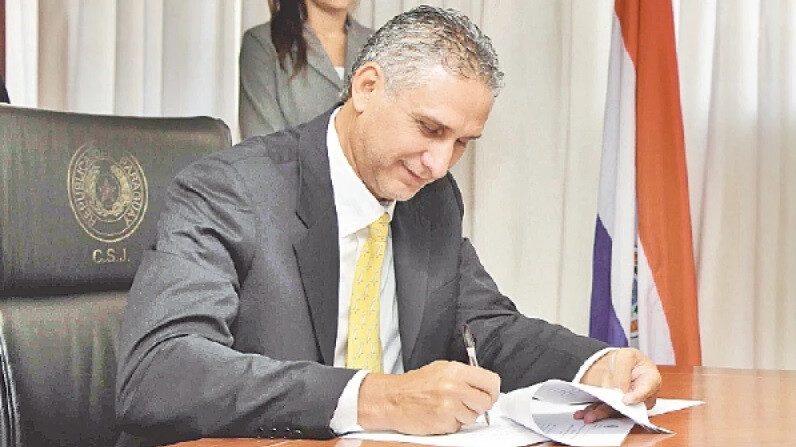
ASUNCIÓN, PARAGUAY – Paraguayan prosecutors have officially indicted Óscar Boidanich, former head of the Secretariat for the Prevention of Money Laundering (Seprelad), on charges of money laundering and obstruction of criminal prosecution. This move further accelerates legal proceedings against key figures in the 'Messer Case,' which has sent significant shockwaves through Paraguayan society. This indictment is particularly significant as it marks the first time a former high-ranking official has been directly held legally accountable in the 'Messer Case,' widely regarded as the largest money laundering scandal in Paraguay's history.
Details of the Indictment of Former Minister Boidanich and Associates
On the morning of June 12, 2025, prosecutors indicted not only former Minister Boidanich but also Raquel Cuevas, former Director General of Financial Analysis, and Melissa Parodi, a Seprelad official, on the same charges.
All three are accused of being aware of suspicious transaction reports (ROS) concerning companies owned by Darío Messer and Juan Pablo Jiménez Viveros, a cousin of then-President Horacio Cartes, yet failing to take appropriate action. This alleged inaction facilitated money laundering activities and obstructed criminal prosecution.
Specifically, the prosecution's indictment reportedly includes details that former Minister Boidanich received reports of suspicious financial flows related to Messer and Jiménez Viveros' companies but either condoned them or intentionally delayed investigations. This can be interpreted as a grave accusation that he not only failed to fulfill his responsibilities as the head of Seprelad in preventing money laundering but actively tried to cover up criminal activities.
The 'Messer Case' involves Darío Messer, linked to Brazil's 'Lava Jato' (Car Wash) corruption scandal, operating a large-scale money laundering network in Paraguay. The case has caused widespread shock due to the alleged involvement of influential political and business figures in Paraguay. The indictment of former Minister Boidanich is expected to be a significant turning point in uncovering the truth of this case.
Asunción and Ciudad del Este Municipal Interventions Approved: Increased Pressure for Local Government Transparency
After extensive debate, the Paraguayan Chamber of Deputies approved government intervention in the municipalities of Asunción and Ciudad del Este. This action is seen as a strong demonstration of the central government's resolve to address alleged corruption and irregularities in local governments.
Ciudad del Este Municipal Intervention
The intervention proposal for the Ciudad del Este municipality, led by Mayor Miguel Prieto, passed with 47 votes from the Cartes faction and opposition forces within the Colorado Party. This intervention follows a long period of controversy regarding the lack of transparency in the financial operations and administrative procedures of the Ciudad del Este municipality. While Mayor Prieto, an opposition figure, claims this intervention is political retaliation, supporters argue that a thorough investigation is necessary to ensure taxpayers' money is being used transparently.
In particular, the need for intervention was further emphasized by a report from the Office of the Comptroller General of the Republic, which found numerous irregularities in the Ciudad del Este municipality. With the intervention approved, a intervention committee dispatched by the central government will review the municipality's finances, administration, contracts, and overall operations, initiating legal proceedings if issues are found.
Asunción Municipal Intervention
The intervention of the capital city's Asunción municipality was also approved with overwhelming support (74 votes in favor, 1 blank vote, 5 absent). The Asunción municipality, led by Mayor Óscar Nenecho Rodríguez, had faced several allegations following investigations by the Comptroller General's Office. Concerns primarily centered on a lack of transparency in the city government's public contracts, budget execution, and asset management, with civil society organizations strongly demanding increased transparency.
The intervention in Asunción's municipality carries significant symbolic weight as it is the capital of Paraguay, and this measure is expected to serve as a warning to other local governments. While some criticize local government interventions as infringements on administrative autonomy, the prevailing view is that they are unavoidable measures to address the rampant corruption issues in Paraguay. All eyes are now on whether this intervention will lead to greater transparency and accountability in Asunción's financial and administrative operations.
María Fernanda Benítez Death Case: Calls for Justice
A protest demanding justice for María Fernanda Benítez, a 17-year-old girl brutally murdered in a case that shocked Paraguayan society, was held in Asunción. Civil society organizations and students collectively called for increased preventative measures against violence against women and rigorous judicial action.
Growing Demand for the Eradication of Violence Against Women
At the protest, Valeria Zayas, a representative of the Paraguayan Student Union (Unión de Estudiantes del Paraguay), not only demanded justice for María Fernanda Benítez but also strongly called for strengthening preventative measures to ensure women are not left vulnerable to male violence.
This case, a heinous crime against a teenager, has brought immense sadness and anger across Paraguay. Protesters chanted slogans such as 'Not One More (Ni Una Menos),' raising social awareness about crimes against women and urging thorough investigations and strict penalties from judicial authorities.
In Paraguay, violence against women, particularly femicide, continues to occur, emerging as a serious social problem. Civil society organizations have criticized the leniency of punishments for such crimes and the inadequacy of victim protection systems. The María Fernanda Benítez case sends a powerful message to Paraguayan society, demanding fundamental reflection and change regarding violence against women. The government and judicial authorities must heed the public's demands expressed in this protest, actively work on practical policy development to prevent violence against women, and improve the judicial system. There is significant interest in whether this case will become a crucial turning point in ensuring women's safety and eradicating violence in Paraguayan society.
[Copyright (c) Global Economic Times. All Rights Reserved.]




























